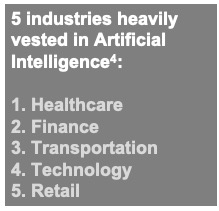
Global disruption and competition are placing new demands on the delivery of IT support services. As global turbulence rocks the business environment, CIOs that use artificial intelligence (AI) to enhance — not replace — a human-first digital strategy in IT support services as part of a strategy to improve service levels and responsiveness will likely gain competitive advantage to survive and thrive.
Definition of the AI-enhanced human connection in IT support services
Human Connection in IT Support Services: the personalization of IT support by closely connecting service requestors with the experts who provide the services. As customers demand excellence in IT support services, an increased level of human connection is a key differentiator. The personalization provides a better understanding of the customer in order to solve their problems, anticipate their needs, and connect with them in a natural, relevant way.
Artificial Intelligence: “[technology that] makes it possible for machines to learn from experience, adjust to new inputs, and perform human-like tasks. Most AI examples that you hear about today – from chess-playing computers to self-driving cars – rely heavily on deep learning and natural language processing. Using these technologies, computers can be trained to accomplish specific tasks by processing large amounts of data and recognizing patterns in the data.”1
AI-Enhanced Human Connection in IT Support Services: the coupling of AI technology with the human touch in order to transform and create differentiation in IT services. When human IT support experts are supercharged with AI, it allows for more rapid resolution of complex issues and delivery of higher quality services.
“A ‘human-first digital strategy’ is the key to future retail success, and those who fail to marry physical and digital will fall by the wayside.”2
–Kevin Johnson, CEO of Starbucks
CIO adoption of a human connection strategy in IT services
Technology support services are being disrupted by digital transformation: automated response systems have replaced help desks, chatbots are used instead of call centers, and software is leveraged to analyze business instead of simply being used as a system of record. As the use of technology in IT services increases, human interactions can decrease, particularly if implemented strictly as a cost-saving measure. An example of this is enterprise software vendors that have automated help desk services and are enjoying operating margins as high as 94% on their annual support fees3. The whitepaper “Adopting a ‘Shift Left’ Strategy to Transform Technology Support Services” describes the risk of human disengagement in the era of digital connection and recommended alternatives.
At the same time, personalization is becoming a differentiator for customers who demand excellence in the services they receive. For many companies, this means shifting expertise closer to the customer. It also involves providing a higher degree of informed, educated, and technology-powered human services that enable customers to self-help when desired, or receive rapid human support.
These trends are being impacted by the current global market disruption. Even though digital transformation is an important focus area for IT services, CIOs must immediately address how to maintain a human connection in IT services when faced with social distancing. CIOs can leverage digital transformation of IT services to help their companies survive and even thrive when faced with rapidly evolving market conditions. Addressing the human connection can provide differentiation in addressing customer expectations while at the same time saving money through automation.
Business impact of using AI to enhance the human connection
In a recent Gartner CIO study, 40% of top-performing companies expected AI to be a game-changer in their organization.5
Yet consider the level of maturity in AI today – what it does best, at present, is quickly and efficiently analyze, categorize, and find relationships in large amounts of data. AI is best-suited to solve narrowly defined problems – by itself, AI can’t replace all IT services jobs, particularly those that require deep analysis or a contextual understanding (i.e. adapting to the environment) in order to find the right solution.
AI for IT services involves shifting knowledge through technology – putting organizational and product expertise in a readily consumable format to support IT services via automation. Retail, for example, has been using the machine learning aspect of AI for some time to enhance customer experience by learning more about shoppers and understanding what buyers want. Although this type of AI enhancement can lower the cost in support service delivery, over-reliance on automated AI alone may decrease the level of personal service by forcing the use of self-service.
Where having a human connection between customer and service provider will provide differentiation and improve service outcomes, the addition of AI can surface insights and correlations to resolve complex issues and deliver higher quality services more rapidly. That is, using AI can make that human-to-human interaction even better. An example of this in action is at Rimini Street, where the company provides a unified, personalized, human-centric support experience, backed by an AI-powered service platform that delivers swifter routing and human response. AI is used to speedily assign cases and/or move them to the right engineers. It improves support resilience by handling resource availability in order to deliver uninterrupted support from hundreds of specialized engineers at scale across thousands of clients with complex, mission-critical software.
The value in using AI to enhance the human connection in IT services
IT service vendors can provide better services, improve customer experience, and increase customer satisfaction by providing an AI-enabled, human-to-human interface that differentiates them from competitors. Digital has made the world of potential IT support service vendors truly global. IT support services providers must differentiate their service experience. They must make people want to come back.
Just as ERP by itself is not differentiating without the easy-to-use features like online order entry, self-service support (even AI-enabled self-service) will become ubiquitous and lack the differentiation that is provided by a human connection in solely digital interactions. When using AI to automate IT support services, companies can lose sight of the elemental part of services that are uniquely human – the ability to interact with each other personally, in real time. Losing that to a programmed machine is not a step forward; it is truly a loss of something very special.
At the same time, without the backing of AI to empower and inform, a strategy of providing a human connection in IT support services is not enough to create differentiation. Using AI as a strategy to enhance (and not replace) the human connection in IT services is applicable cross-industry, providing customer service interactions that are truly engaging.
Enhance — Not Replace — A Human-First Digital Strategy in IT Services
When looking at transforming an IT services model, identify where the human element in services can improve overall outcomes. Use expertise and customer profiles to guide which IT services are strong candidates for using AI technology to enhance that human connection.
Purchasing professionals seeking enterprise software support should strongly consider providers that use AI technology to enhance their human connection. Seek partners that have the wisdom to balance digitization with personalization. See this put into practice with Rimini Street’s ultra-responsive services for enterprise software support.
1 https://www.sas.com/en_us/insights/analytics/what-is-artificial-intelligence.html
3 https://www.brightworkresearch.com/sap/2018/09/the-giant-margins-for-sap-and-oracle-support/
4 https://www.ciodive.com/news/the-state-of-ai-across-5-industries/570491/
5 Gartner: The 2019 CIO Agenda: Securing a New Foundation for Digital Business” 3 April 2020, ID G00366991

